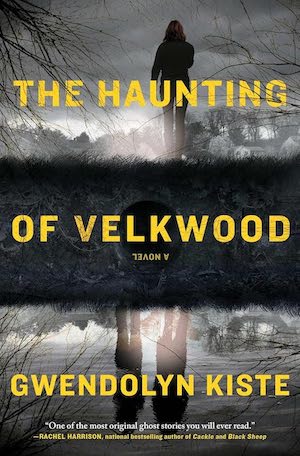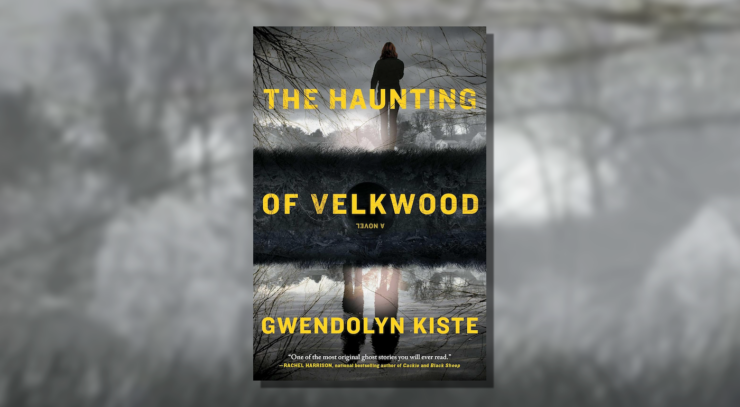We’re thrilled to share an excerpt from Gwendolyn Kiste’s The Haunting of Velkwood, a horror novel about three childhood friends who miraculously survive the night everyone in their suburban hometown turned into ghosts—out from Saga Press on March 5.
The Velkwood Vicinity was the topic of occult theorists, tabloid one-hour documentaries, and even some pseudo-scientific investigations as the block of homes disappeared behind a near-impenetrable veil that only three survivors could enter—and only one has in the past twenty years, until now.
Talitha Velkwood has avoided anything to do with the tragedy that took her mother and eight-year-old sister, drifting from one job to another, never settling anywhere or with anyone, feeling as trapped by her past as if she was still there in the small town she so desperately wanted to escape from. When a new researcher tracks her down and offers to pay her to come back to enter the vicinity, Talitha claims she’s just doing it for the money. Of all the crackpot theories over the years, no one has discovered what happened the night Talitha, her estranged, former best friend Brett, and Grace, escaped their homes twenty years ago. Will she finally get the answers she’s been looking for all these years, or is this just another dead end?
My head spins, everything in me going numb. It feels like I’ve been turned inside out, my skin flayed and tacked back on again, and maybe that’s exactly what’s happened. Maybe that’s the only way to get into this place.
But what I know for sure: I’m here. Back on this street, back where I used to belong.
When I woke up this morning, it was the end of fall, but in this neighborhood, it’s summertime, jubilant sprinklers cascading over lawns, the solstice sun baking the pale concrete. The street’s bathed in jaundice yellow, the whole world like a desaturated photo. I try to remember if it ever really looked like this, or if this is merely a trick of the afterlife, this place becoming more a memory than a flesh-and-blood reality.
Either way, I’m looking into the past, and I’m not sure yet that I like what I see.
I inhale a ragged breath, and the thin air burns my lungs. I wonder how long I can survive here. I wonder how long anyone can survive.
At least I already know how long I’ll stay. One hour and not a minute over. That’s what Jack suggested, and after what happened to Grace, I won’t take any chances. At least not any more chances than I’ve already taken.
With my hands steady, I start the timer and then I start walking, right down the middle of Velkwood Street. It’s only a few steps at first, my vision gauzy, as though I’m peering through a hundred layers of chiffon. The pavement is solid beneath my feet, but it barely feels real.
Our neighborhood was never built for subtlety, every house arrayed in candy-colored siding, the roofs with sharp, almost comical angles. We all lived in split-levels with the same floorplans, the mid-century equivalent to making it in suburbia, but that dream was a short-lived one. The street was dated, almost kitsch, by the time we started high school.
“We’re stuck in the past,” Brett once said, as she and I sat together on the curb, each of us devouring one half of a cherry twin pop we procured from the local ice cream truck. “We’ll never escape it.”
“You don’t know that,” I said, my fingers stained red. But maybe she did.
As I keep moving, I count the houses. All eight of them are here, right where they belong, three on the left side of the street, and five on the right. A lopsided arrangement, but it wasn’t supposed to stay like this forever. We were supposed to get new houses, new neighbors, new possibilities. But that never happened. Instead, two of the houses had been vacant since we were in junior high, the For Sale signs still in the front yards, like a promise nobody could keep.
I don’t look too long at them. I keep heading toward the place where I once belonged, the fourth house on the right, almost at the end of the street. Almost at the end of the world.
Buy the Book


The Haunting of Velkwood
Nearby, there are empty cans of Coca-Cola abandoned on the curb, ants swarming around the sweetness, hundreds of them coming from every direction.
I’m passing Grace’s house now, the second on the right, the slider windows gazing out at me, the pink trim glinting in the sun. Everything in Grace’s life was always pink and bright and cheerful. Her mother would have it no other way.
“The problem with you girls is that you need to smile more,” she used to tell us when we all stayed for sleepovers, and my stomach would always clench, because from the look on Brett’s face, she wasn’t ever thinking about smiling. She was always thinking of spitting right in Mrs. Spencer’s eye.
The sun shifts in the sky, disappearing behind a patch of pale clouds, thick as marshmallow fluff. That’s when I see them. Two people walking across the verdant yard. Grace’s younger brothers maybe. It looks like them, arrayed in grimy Mötley Crüe T-shirts and hand-me-down Levi’s, one of them holding a Spalding basketball. This is it, a chance to finally meet someone. To ask them what’s happened. To ask them about Sophie.
They drift out of the yard and onto the street, their figures obscure and wavering. I squint at them, shielding my eyes from the blazing sun, but I still can’t recognize them, and as they get closer, I realize why. My vision’s clear now, but they’re not. Their faces are blurred out, almost as if they’re moving too fast, a hundred expressions flashing by at once, joy and dread and rage mingling together. Their skin’s gray as a thunderstorm, but they don’t seem to notice. They just keep moving forward.
Moving right toward me.
I seize up, my feet turned to lead, a scream lodged in my throat. I’m sure they’ve spotted me here, I’m sure this is it. But they pass me by, as though everything’s normal, as though they don’t see me at all. And that’s probably for the best, because without a clear mouth to speak, I doubt they could help me much. I doubt they can help themselves much either.
I’m running now, away from them, away from everything, heading deeper into this neighborhood, even though I should retreat, back the way I came, back into reality. Except right now I’m not sure where reality is.
So I run toward the place where I grew up. Toward where my family should be.
Up ahead, at the house next to ours, there’s another figure sitting out front. Only this one isn’t the same as the other two. She has a face, and I recognize her in an instant.
Mrs. Owens, creaking back and forth on her half-rotted porch swing. A widow from way back, we used to think she was the only lonely person on Velkwood Street. That was a long time ago, back when we didn’t know much about loneliness. Or much about ourselves.
“You don’t belong here,” she’s saying, and hope threads through me, because I’m convinced she’s talking to me. I sprint across the sidewalk, rushing onto her lawn, just glad to see a face, an actual face.
“How are you?” I blurt out, but she doesn’t move, doesn’t even flinch at the question. I watch her for a while before waving my hands in front of her. There’s nothing, not a hint of recognition.
I’m right here, but I’m nowhere at the same time.
“Don’t you listen?” she asks, her voice like rusted nails. “I told you already you don’t belong here.” She’s scowling hard at something, and I follow her gaze until I spot it.
A frog sitting on her front step, staring off at nothing, its expression as impassive as the seasons.
“You should move along,” Mrs. Owens says, still glaring at the frog. “You don’t have much time.”
And I don’t have much time either. My house is only next door. I’m almost there. I’m almost home.
“Maybe we can talk later,” I say to her, and I hope I’m right.
Grass crunches like brittle bone beneath my feet as I cross the yard. A sharp breeze shivers down the street, the air turning thick and fragrant with honeysuckle, like something out of a dream. I hold my breath and keep going, all the way up the narrow walkway that leads to my front door. Gladiolas creep along the perimeter of the house. The summer before I left for college, I planted the bulbs with Sophie, the two of us in old overalls, dirt caked beneath our fingernails.
“How long will it take them to grow?” she asked, her arms wrapped around my legs.
“A few weeks until we see the first sprouts.” I pulled her close, and she hugged me a little tighter. “Three or four months before flowers.”
She crinkled up her nose. “Why do they take so long to grow?”
“The same reason you do,” I said with a laugh. “You’ve got to give things time.”
Now the flowers have all the time in the world. And so does Sophie.
I’m on the front step now, everything I want and everything I fear wrapped up in this moment. My heart squeezed tight in my chest, I reach to knock on the front door, but I don’t have a chance. The lock clicks on the other side, and my mother is suddenly standing right in front of me.
She doesn’t look like those terrible figures from the sidewalk. Instead, everything about her is the same as I remember. Her wide eyes as blue as tidepools, a bolt of gray tucked behind one ear, the same furrowed lines between her brows.
“I’m home,” I whisper, but the same as Mrs. Owens, she doesn’t see me. Nobody can. In here, I’m the ghost, the trespasser, the spirit who can barely disturb the air.
From the book: The Haunting of Velkwood by Gwendolyn Kiste. Copyright © 2024 by Gwendolyn Kiste. Reprinted courtesy of Saga Press, an imprint of Simon and Schuster.










